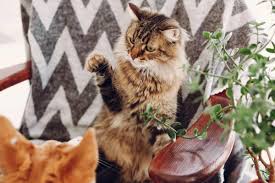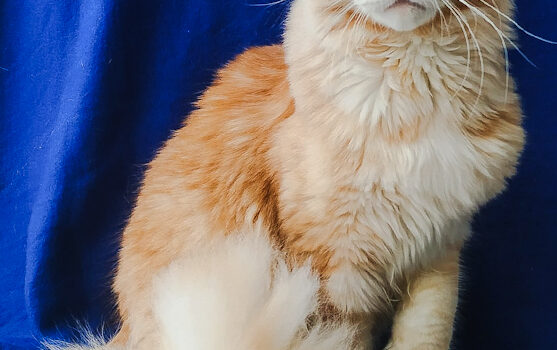You just sat down for dinner and are ready to eat after a long day. Suddenly, your Maine Coon wants a bite to eat! Naturally, we want to share everything with our pets, but you may find yourself wondering what is or isn’t okay for your Maine Coon to eat. Rest assured, your Maine Coon can enjoy lots of your favorite treats safely! Here’s a comprehensive list of what is and isn’t safe for your Maine Coon to eat.
Human Foods That Aren’t Safe For Your Maine Coon
According to Maine Coon Central and Fetch by Web MD, the following foods are not safe for your Maine Coon:
- Chocolate. We know chocolate is bad for dogs, but did you know that it’s also bad for cats? It can cause toxicity due to a chemical compound called theobromine. Humans can metabolize this but dogs and cats cannot. Not only is it toxic, but cats can’t taste sweet things! Did you know? Cats only have about 470 taste buds compared to our 9,000, according to Catster. This means your cat can’t taste anything sweet!
- Alcohol. Alcohol is toxic enough to people with prolonged or excessive consumption, but’s incredibly toxic to your Maine Coon. So much so, that it can cause seizures, tremors, and even death.
- Milk and dairy products. We love cheese and we’d love to share it with our cat! However, Maine Coons specifically are lactose intolerant. Cats cannot digest lactose. Once they wean off their mother’s milk, they develop intolerance.
- Raw meat. We’ve heard of the benefits of raw diets for our pets but it’s best if this is one trend you avoid for the well-being of your Maine Coon. It can often contain harmful bacteria that can cause illness, like salmonella or E. coli.
- Sugar and xylitol. Since cats can’t taste sweet things, they aren’t really missing out on much with sugar and xylitol. Excess sugar can cause hypoglycemic shock while xylitol is incredibly toxic and can lead to liver failure.
- Fish. While fish is okay in moderation for your Maine Coon, too much can cause troublesome mercury levels.
- Gluten. Keep your Maine Coon away from bread and pastries! Cats have very sensitive and delicate digestive symptoms and often can’t metabolize gluten, much like lactose. Steer clear of gluten, especially in dry kibble.
- Onions and garlic. Again, we know onions and garlic can be deadly for dogs, but they can also be deadly for your Maine Coon too! The allium family nees to be avoided at all costs. Onions and garlic can cause the slow and sustained breakdown of red blood cells in cats and dogs. This can lead to anemia.
- Grapes and raisins. Grapes and raisins are poisonous to both dogs and cats! Though the cause isn’t exactly known, even a small amount can cause immediate liver failure and death.
- Raw eggs. Similar to raw meat, raw eggs can contain harmful bacteria like salmonella and E. coli that can lead to illness.
- Caffeinated beverages. Caffeine is incredibly toxic for cats, since they can’t metabolize it. Keep your morning cup of joe away from your Maine Coon!
- Mushrooms. Though we might love mushrooms on our pizza, excess mushroom consumption can cause toxicity in your Maine Coon.
- Avocado. Avocado, specifically the peel and pit, are toxic to both cats and dogs.
- Nuts. Almonds and walnuts are okay in moderation, but macadamia nuts can be specifically toxic.

Human Foods That Are Safe For Your Maine Coon
- Salmon. Salmon is fine in moderation for your Maine Coon. Simply feed them a small serving and watch their eyes light up with joy!
- Spinach. A true superfood, spinach is perfectly fine for your Maine Coon to eat. Rich in iron, calcium and vitamins A, C and K, spinach is a wonderful natural option alongside your Maine Coon’s favorite meat.
- Eggs. Eggs are great to feed your Maine Coon when they’re cooked. Packed with proteins and healthy fats, they’re a perfectly safe and nutritious treat.
- Cantaloupe. Though cats can’t taste sweet things, they may like cantaloupe’s rich water content and fun texture. Its rich antioxidant content makes it a wonderful year-round snack!
- Chicken. Your Maine Coon is a natural carnivore and chicken is one of the best natural foods you can feed them. As long as you stick with lean chicken, stay away from additives, and remove the skin, it can be a wonderful, protein packed staple in your Maine Coon’s diet!
- Bananas. Again, though cats can’t taste anything sweet, that might not stop them! Bananas are a perfectly safe treat thanks to their high fiber and potassium content.
- Oatmeal. Oatmeal is a great treat when it’s whole and consumed in moderation. In fact, it’s found in a lot of commercial cat foods!
- Pumpkin. Pumpkin is a rockstar treat for your cat, especially with the spooky season here! Pumpkin has been used as a natural remedy for gastrointestinal upset in veterinary medicine for decades. It can solidify stools and help with constipation.
- Apples. Another great option for your Maine Coon, apples contain lots of nutrients and fiber which make them a perfect, water rich snack.
- Blueberries. Antioxidant rich, blueberries are a wonderful option for your Maine Coon thanks to their low sugar content.
- Peas. Peas are often found in commercial cat food alongside oatmeal. Their high fiber, vitamin C, and vitamin A content makes them a wonderful snack or dinner option!
- Turkey. With Thanksgiving just around the corner, rest assured that your Maine Coon can sneak a few bites of the turkey! Skip the gravy though, since it provides them no nutritional benefit.
- Carrots. As long as carrots are cooked, they’re a fine snack for your Maine Coon.
- Rice. Rice is a fabulous option for your Maine Coon, especially if they’re having gastrointestinal upset. It can help solidify their stools.
All in all, your Maine Coon can enjoy dinner or dessert with them. Food is love to our pets. In the limited ways we can communicate with them, sharing a bite to eat is one of the ways you can show your Maine Coon some extra love!
References
https://pets.webmd.com/cats/ss/slideshow-foods-your-cat-should-never-eat
https://www.wkbw.com/news/12-human-foods-that-are-safe-for-your-cat-to-eat
https://be.chewy.com/nutrition-food-treats-15-human-foods-that-are-safe-for-cats/


